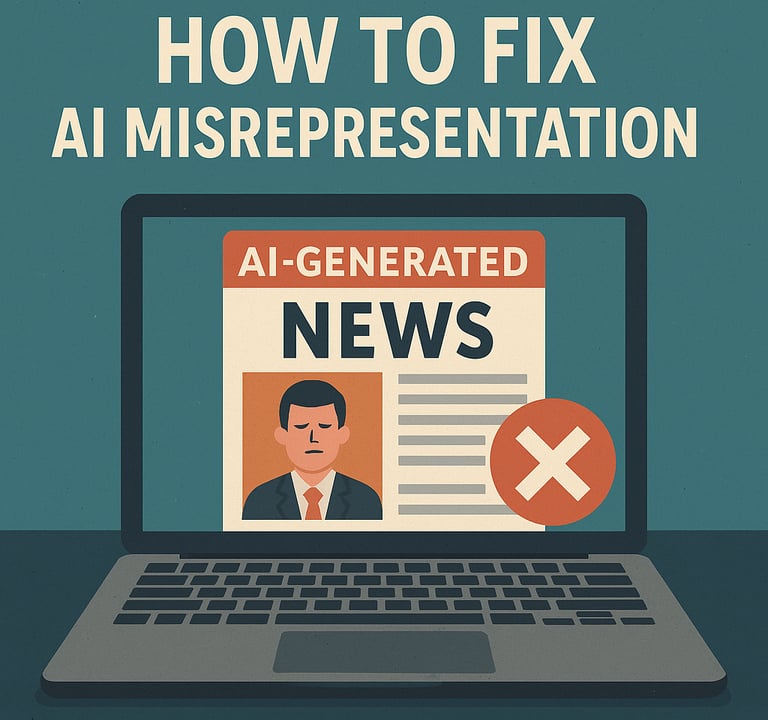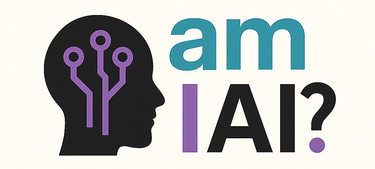When AI Gets It Wrong: Misrepresentation, Reputation, and Repair
AI can get stories wrong, misrepresent people, and damage reputations. Learn why it happens, what you can do to protect yourself or your business, and how AI companies should be held accountable.ost description.
Haily Fox
9/17/20256 min read


Artificial Intelligence: A Powerful Tool With A Powerful Impact On Reputation
More now than ever, many people are turning to artificial intelligence instead of Google or everyday search engines, as it is undoubtedly better at collecting information and understanding the context of your questions rather than simply searching by keywords. It is also a very fast way to summarize important information. But what happens when the stories it gives you are incorrect? AI can’t always get it right, but this misinformation can have devastating consequences for businesses or individuals.
This is why I really want to dive into not only understanding why AI makes this mistakes, but what can be done about it once it’s out there.
How Does AI Misrepresent People and Why
There are plenty of ways AI can misrepresent a person or business, and many reasons for it.
Summarization Bias- AI tools, when asked to summarize things like books or documentaries, can simplify things to the point that it loses nuance or details, creating a vague misrepresentation without proper context. This is called “context collapse” and is a well documented problem in Natural Language Processing (NLP). It is a result of the models compressing information.
Data Limitations in AI Model Training- Because AI is trained from huge datasets scraped from the internet, it also unfortunately picks up information that is outdated, false, or biased. Constant retraining and fine tuning with reliable data is an important part of preventing this, but unfortunately is just part of the nature of AI. It also has the problem of putting extra weight or emphasis on incorrect information that is repeated consistently, adding fuel to rumors and false information.
Hallucinations and Fabrication- Hallucinations are when an AI model states and creates false information. From creating fake precedents submitted by lawyers to claiming a public figure is involved in criminal activity, these are technical glitches that can have devasting impacts on reputations.
Bias- Large Language Models (LLMs) learn off of what people post online, meaning it is not immune to picking up on bias and stereotypes that are perpetrated by humans. For example, women may be described in appearance rather than their expertise or marginalized communities may be mischaracterized. This is an issue that is beyond misrepresentation, but is a reproduction of systemic oppression and inequalities.
How Can This Hurt Businesses or Individuals?
Personal Impact- I’ve seen it happen, where a person looks themselves up on AI and reads harmful and untrue narratives about themselves. This can feel like a very powerless situation to be in, as AI-generated content can spread fast. An example of this is in the recent shooting of Charlie Kirk, where AI-generated misinformation spread like wildfire about motives, affiliations, and individuals responsible.
Damage to Professional Reputation- one single misrepresentation on AI can harm client trust, hiring, partnerships, or even create legal liabilities.
Erosion of trust in AI: Every high-profile mistake feeds skepticism and slows down responsible adoption of otherwise useful AI tools.
Can Anything Be Done If AI Misrepresents A Business or Individual?
So, lets say AI has misrepresented you or your business, and now you are in a panic. Take a minute, because this doesn’t have to be the end for you. Lets break down some of the options you have in this circumstance.
Reputation Management in the AI Era
Publish accurate, high-quality content regularly so AI has reliable data to learn from. The more authoritative your own material, the harder it is for false or misleading outputs to dominate. You can even ask AI for advice on how to this, or brainstorm ideas. Making your content Generative Engine Optimized (GEO) is important, and here is our blog post explaining more about what that means.
Monitoring and Alerts
Set up tools like Google Alerts, media monitoring software, or AI audit services to track how your name or brand is being represented. Early detection means you can respond before reputational damage spreads.
Respond Quickly and Correct the Record
When an AI system misrepresents you, issue clarifications promptly—through your website, LinkedIn, or other official channels. Visibility matters. It is also important to point the mistake out to AI, and maybe even ask it where it got the false information from.
Bring in an Expert
This is where someone like me comes in. As an AI consultant, I help businesses and individuals audit how they’re being represented by AI systems, identify risks, and put proactive safeguards in place. That might include SEO strategies, content pipelines, or direct communication with platforms to ensure corrections are made.
What AI Companies Must Do (and How to Hold Them Accountable)
Of course, AI companies have liability in some cases and also responsibility to uphold. Unfortunately, it is still often up to us as everyday people to make sure they uphold these. Let’s take a closer look at what companies need to be doing and how we can hold them to it.
Governance and Guardrails- Adopting ethical frameworks such as NIST’s AI Risk Management Framework, which are systems that require systematic fact checking, checking for bias, accuracy and transparency. The science and upkeep behind these should also be regularly updated as AI is constantly evolving.
Human-in-the-Loop Systems- AI should never be left to handle sensitive stories unchecked and on its own. Companies have a responsibility to keep human reviewers involved, especially in high-risk areas like journalism, customer service, or HR.
Right to Correction- Platforms must provide clear ways for people to flag AI-generated errors and request corrections or removals. This principle is already reflected in laws of some countries.
Transparency and Disclosure- Information or research generated by AI should always be labeled as such. This gives audiences context and prevents people from treating AI errors as verified fact. The laws of how this would be implemented would look different in different countries and for different models, but it is important to keep our governments involved in this process.
Accountability Mechanisms
Regulators and users alike can hold AI companies accountable by:
Supporting legislation that mandates auditing and correction processes.
Publicly pressuring platforms when they misrepresent people.
Choosing to do business with companies that prioritize transparency and responsible AI practices
Conclusion
AI is still a great tool for research, gathering information and building a reputation, but as it is such a new technology, it is also important for us as users to be up to date on how to use it, what to look for, and how to do our own independent research.
Being on top of your own reputation on AI is very important, because if you search yourself and get false information, it is likely others will as well. Knowing when you can handle it yourself vs when you need to call in an expert or contact the company itself is key.
If you have been a victim of misrepresentation by AI, and are looking for expert support, contact us at Am I AI to see if our services can help you
FAQs
Q1: How does AI end up misrepresenting people or businesses?
AI pulls from huge amounts of data online. If that data is biased, outdated, or just flat-out wrong, the AI can repeat it. On top of that, AI sometimes “hallucinates” details that sound real but aren’t, which can make a story come across in a way that’s misleading.
Q2: What should I do if AI puts out something false about me?
Don’t ignore it. Post a correction on your own platforms—your website, LinkedIn, social media—so there’s a clear record of the truth. Save proof of the error and, if possible, contact the platform directly to ask for it to be fixed or removed. It’s also smart to set up monitoring tools so you catch issues fast.
Q3: Why would I hire an AI expert for this?
Because you don’t need to figure it all out alone. An AI consultant can help you see how you or your brand show up in AI systems, flag risks before they blow up, and put strategies in place so the “right” version of your story gets told. We also know how to work with platforms when something goes wrong.
Q4: What should AI companies be doing differently?
They need to take responsibility. That means building strong governance frameworks, keeping human oversight in the loop for sensitive stories, giving people a way to correct errors, and labeling when content is AI-generated.
Q5: How do we hold AI companies accountable?
Push for laws and standards that force transparency. Call out companies when they cause harm. And make the choice to support tools and platforms that show they care about accuracy and ethics.
Q6: Is it safe to use AI for storytelling or business communication?
Yes, but not without human oversight. AI can be incredibly useful, but when it comes to sensitive topics like personal stories, legal issues, or health, you always need a human double-check before anything goes public.
